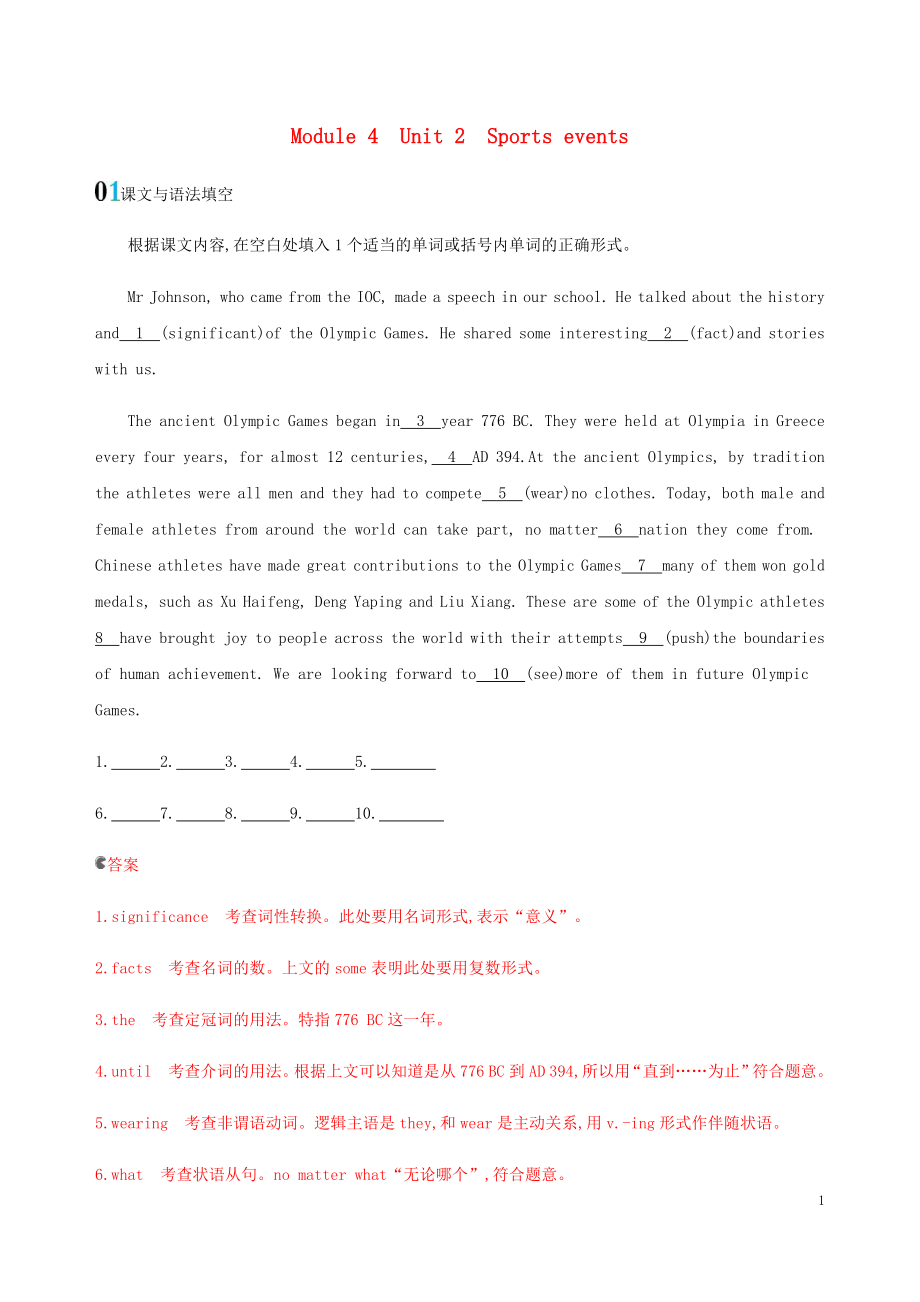《(新課標(biāo))2020版高考英語(yǔ)一輪復(fù)習(xí) Module 4 Unit 2 Sports events單元提升 牛津譯林版》由會(huì)員分享��,可在線閱讀��,更多相關(guān)《(新課標(biāo))2020版高考英語(yǔ)一輪復(fù)習(xí) Module 4 Unit 2 Sports events單元提升 牛津譯林版(6頁(yè)珍藏版)》請(qǐng)?jiān)谘b配圖網(wǎng)上搜索��。
1���、Module 4 Unit 2 Sports events
課文與語(yǔ)法填空
根據(jù)課文內(nèi)容,在空白處填入1個(gè)適當(dāng)?shù)膯卧~或括號(hào)內(nèi)單詞的正確形式����。
Mr Johnson, who came from the IOC, made a speech in our school. He talked about the history and 1 (significant)of the Olympic Games. He shared some interesting 2 (fact)and stories with us. ?
The ancient Olympic Games began
2�、in 3 year 776 BC. They were held at Olympia in Greece every four years, for almost 12 centuries, 4 AD 394.At the ancient Olympics, by tradition the athletes were all men and they had to compete 5 (wear)no clothes. Today, both male and female athletes from around the world can take part, no matter 6
3、nation they come from. Chinese athletes have made great contributions to the Olympic Games 7 many of them won gold medals, such as Xu Haifeng, Deng Yaping and Liu Xiang. These are some of the Olympic athletes 8 have brought joy to people across the world with their attempts 9 (push)the boundaries of
4�����、 human achievement. We are looking forward to 10 (see)more of them in future Olympic Games.?
1. 2. 3. 4. 5. ?
6. 7. 8. 9. 10. ?
答案
1.significance 考查詞性轉(zhuǎn)換����。此處要用名詞形式,表示“意義”���。
2.facts 考查名詞的數(shù)。上文的some表明此處要用復(fù)數(shù)形式�����。
3.the 考查定冠詞的用法��。特指776 BC這一年���。
4.until 考查介詞的用法。根據(jù)上文可以知道是從776 BC到AD 394,所
5�����、以用“直到……為止”符合題意�。
5.wearing 考查非謂語(yǔ)動(dòng)詞。邏輯主語(yǔ)是they,和wear是主動(dòng)關(guān)系,用v.-ing形式作伴隨狀語(yǔ)��。
6.what 考查狀語(yǔ)從句���。no matter what“無(wú)論哪個(gè)”,符合題意���。
7.and 考查并列連詞�。和前文“中國(guó)運(yùn)動(dòng)員為奧林匹克運(yùn)動(dòng)會(huì)做出了巨大的貢獻(xiàn)”并列,“許多人得了金牌”��。
8.who/that 考查定語(yǔ)從句�����。先行詞是athletes,關(guān)系代詞who/that在從句中作主語(yǔ)不能省略�����。
9.to push 考查固定短語(yǔ)��。with one’s attempts to do...“嘗試去做……”����。
10.seeing 考查非謂語(yǔ)動(dòng)詞。
6�、介詞to后面接動(dòng)名詞作賓語(yǔ)。
課文與短文改錯(cuò)
根據(jù)課文內(nèi)容,對(duì)下面材料進(jìn)行修改��。文中共有10處語(yǔ)言錯(cuò)誤,每句中最多有兩處�。錯(cuò)誤為單詞的多詞、少詞或錯(cuò)詞�����。
The Olympic Games are hold every four years. The ancient Olympic Games began around the year 776 BC in Greece.At that time the young men competed with running,jumping and wrestling. And women were not allowed to take p
7、art in the games in past. The old Olympic Games stopped after about the year AD 394.
However,the first Olympic Games in modern times were happened in 1896. It was an Frenchman,Pierre de Coubertin,who brought the Olympics back to life. He dreamt that the Olympics would make it possibly for people of
8�、 all countries to live side by side for peace. The Olympic motto is “Faster,Higher,Strongest”.It means that every athlete should try to run faster,jump higher,and throw farther. The 2008 Olympic Games were held in Beijing,and it was the first time when the Chinese athletes had won the most gold meda
9、ls.
答案
The Olympic Games are holdheld every four years. The ancient Olympic Games began around the year 776 BC in Greece. At that time the young men competed within running,jumping and wrestling. AndBut women were not allowed to take part in the games in ∧the past. The old Olympic Games stopped af
10���、ter about the year AD 394.
However,the first Olympic Games in modern times were happened in 1896. It was ana Frenchman,Pierre de Coubertin,who brought the Olympics back to life. He dreamt that the Olympics would make it possiblypossible for people of all countries to live side by side forin peace.
11�����、The Olympic motto is “Faster,Higher, StrongestStronger”.It means that every athlete should try to run faster,jump higher,and throw farther. The 2008 Olympic Games were held in Beijing,and it was the first time whenthat the Chinese athletes had won the most gold medals.
1.hold→held 考查動(dòng)詞的語(yǔ)態(tài)。本句是被動(dòng)語(yǔ)態(tài),應(yīng)
12����、該用be+done形式,hold的過去分詞為held。
2.with→in 考查介詞的用法�����。此處用介詞in,compete in sth.“參加比賽”����。
3.And→But 考查并列連詞的用法。上下文之間是轉(zhuǎn)折關(guān)系,前文是男子參加奧運(yùn)會(huì),后面講“但是女子不準(zhǔn)參加……”���。
4.in后面加the 考查冠詞�。短語(yǔ) in the past“過去”,不能省略定冠詞the。
5.去掉were 考查動(dòng)詞的語(yǔ)態(tài)����。動(dòng)詞happen是不及物動(dòng)詞,沒有被動(dòng)語(yǔ)態(tài)。
6.an→a 考查不定冠詞�。Frenchman以輔音音素開頭,其前用不定冠詞a, a Frenchman“一個(gè)法國(guó)人”。
7.possibly
13����、→possible 考查形容詞的用法。本結(jié)構(gòu)是make it+adj.+for sb. to do sth.,本結(jié)構(gòu)中形容詞作賓補(bǔ)�。
8.for→in 考查介詞。live in peace“和平生活”�����。
9.Strongest→Stronger 考查形容詞的比較級(jí)���。前后文對(duì)等性,“Faster,Higher,Stronger”意為“更快,更高,更強(qiáng)”�����。
10.when→that 考查固定句型�。it is/was the first time that+完成時(shí)“第一次……”,本結(jié)構(gòu)中習(xí)慣用that,不用when。
話題知識(shí)與寫作
用本單元所學(xué)詞匯和句式結(jié)構(gòu)翻譯句子�����。
1.眾所周知
14�����、,奧運(yùn)會(huì)每四年舉辦一次��。(hold;every four years)
?
2.許多國(guó)家都想申辦奧運(yùn)會(huì),因?yàn)樗粌H是展示國(guó)力的機(jī)會(huì),也是一種榮譽(yù)�����。(bid to do;display;honour)
?
3.在奧運(yùn)會(huì)上,運(yùn)動(dòng)員們不僅在為金牌而比賽,也為國(guó)家榮譽(yù)而戰(zhàn)���。他們?yōu)閵W運(yùn)會(huì)做出了巨大貢獻(xiàn)。(compete for;make contributions to)
?
4.無(wú)論多么艱難,他們必須堅(jiān)持�����。(no matter how;hang on)
?
5.許多運(yùn)動(dòng)員通過自己的精彩表現(xiàn)給觀眾帶來了快樂�����。(it is...that)
?
【聯(lián)句成篇】 把以上句子聯(lián)成短文,要求銜接
15、連貫�����、過渡自然�。
?
?
?
?
?
?
答案
1.It’s known that the Olympic Games are held every four years.
2.Many countries hope to bid to host the Olympics,because it is not only a chance to display the ability of a country but also an honour.
3.At the Olympic Games,the athletes compete not only for gold m
16、edals,but also for the honour of their countries.They make great contributions to the Olympic Games.
4.No matter how hard it is,they must hang on.
5.It is with their wonderful performances that many athletes bring joy to the audience.
【參考范文】
It’s known that the Olympic Games are held every four
17�、years. Many countries hope to bid to host the Olympics,because it is not only a chance to display the ability of a country but also an honour. At the Olympic Games,the athletes compete not only for gold medals,but also for the honour of their countries.They make great contributions to the Olympic Ga
18、mes.
No matter how hard it is,they must hang on.It is with their wonderful performances that many athletes bring joy to the audience.
單元詞匯拓展速記
1.“-mate”后綴小結(jié)
①teammate隊(duì)友
②classmate同班同學(xué)
③roommate室友
④schoolmate校友
⑤deskmate同桌2.“by+n.”短語(yǔ)集錦
①by design 故意地
②by tradition 按照傳統(tǒng)
③by chance 偶然,碰巧
④by accident 偶然,碰巧3.“n.+prep.+n.”短語(yǔ)薈萃
①arm in arm 臂挽臂地
②hand in hand 手挽/牽手地
③back to back 背對(duì)背
④side by side 肩并肩地
⑤face to face 面對(duì)面地
6
 (新課標(biāo))2020版高考英語(yǔ)一輪復(fù)習(xí) Module 4 Unit 2 Sports events單元提升 牛津譯林版
(新課標(biāo))2020版高考英語(yǔ)一輪復(fù)習(xí) Module 4 Unit 2 Sports events單元提升 牛津譯林版

